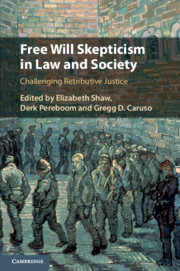Book contents
- Free Will Skepticism in Law and Society
- Free Will Skepticism in Law and Society
- Copyright page
- Contents
- Contributors
- Chapter 1 Free Will Skepticism in Law and Society: An Overview
- Part I On the Practical Implications of Free Will Skepticism
- Chapter 2 Free Will Denial and Deontological Constraints
- Chapter 3 Free Will Skepticism and Its Implications: An Argument for Optimism
- Chapter 4 Beyond the Retributive System
- Part II Alternatives to Retributive Punishment
- Part III Free Will Skepticism and the Criminal Justice System
- Index
- References
Chapter 4 - Beyond the Retributive System
from Part I - On the Practical Implications of Free Will Skepticism
Published online by Cambridge University Press: 26 August 2019
- Free Will Skepticism in Law and Society
- Free Will Skepticism in Law and Society
- Copyright page
- Contents
- Contributors
- Chapter 1 Free Will Skepticism in Law and Society: An Overview
- Part I On the Practical Implications of Free Will Skepticism
- Chapter 2 Free Will Denial and Deontological Constraints
- Chapter 3 Free Will Skepticism and Its Implications: An Argument for Optimism
- Chapter 4 Beyond the Retributive System
- Part II Alternatives to Retributive Punishment
- Part III Free Will Skepticism and the Criminal Justice System
- Index
- References
Summary
The retributive system is motivated by powerful strike-back desire (actually a general desire to pass the pain along) combined with nonconscious belief in a just world. To preserve belief in a just world, we must suppose that most people are receiving their just deserts, and that requires belief in moral responsibility. Neoliberal societies are deeply dedicated to individual moral responsibility, resulting in harsh judgments and gross inequity. The systems approach offers a promising path away from moral responsibility and toward a more just and equitable society.
Keywords
- Type
- Chapter
- Information
- Free Will Skepticism in Law and SocietyChallenging Retributive Justice, pp. 73 - 96Publisher: Cambridge University PressPrint publication year: 2019

